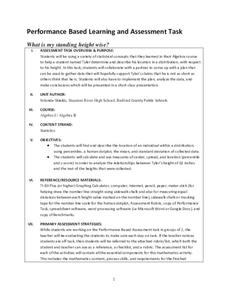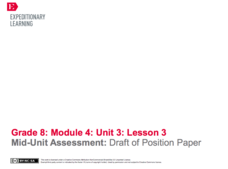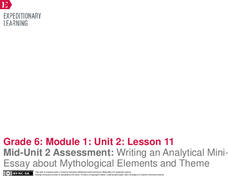Acoustical Society of America
Wave Basics
Catch the fast wave. Using a computer simulation, pupils experiment with amplitude, frequency, damping, and tension of a string to determine which affects the speed of the wave. Learners record the observations to determine their...
Alabama Wildlife Federation
Big Fish, Little Fish
Tag, you're eaten! A lesson on predator-prey relationships uses the game freeze tag as a model. Learners become either a predator or prey and play a game of tag as the prey tries to reach areas that house food and shelter. During the...
Radford University
What is My Standing Height Wise?
Given a scenario in which a class member wants to prove his height is not an outlier, pairs devise a plan and gather evidence to help support his claim. The small groups implement their plans and create graphical displays of their data...
EngageNY
Mid-Unit Assessment: Draft of Position Paper
What is the purpose of an introduction and conclusion? Using the resource, scholars review the model position paper from activity one and discuss the author's choices. Next, they draft their position papers' introductory and concluding...
Radford University
Tuition Cost Activity
Can I afford to go to college? Small groups design a method to research college tuition for several years and make a prediction of costs in 2025. Classmates plot the the data on a scatter plot and graph the line of best fit to make their...
Radford University
Is Fall Normal?
Fine the normality of fall measurements. Pairs collect measurements of fall leaves and one other fall object. Using the measurements, the groups determine the descriptive statistics for the object and using the Empirical Rule, figure out...
American Museum of Natural History
Keeping a Field Journal
Recording scientific evidence allows for important discoveries and conclusions. A remote learning resource outlines how to create a field journal to record scientific observations. The outline resource includes notation about the...
University of Waikato
Water Runoff
Teachers demonstrate water runoff on a hill and its effect on soil erosion. Pupils observe as the instructor changes the steepness of the hill and see whether vegetation covers the soil. Learners then use their observations to make...
EngageNY
Analyzing Douglass’s Purpose
Class members continue analyzing text excerpts from Narrative of the Life of Frederick
Douglass. They read and draw conclusions to determine Douglass's view on slavery. Learners finish by discussing with partners how the excerpts...
EngageNY
Reflecting on Douglass’s Narrative
The conclusion of Narrative of the Life of Frederick Douglass comes to life in a reader's theater. The class discusses the use of quotation marks in the text and then divides parts among the groups. After the performances,...
Missouri Department of Elementary
What Are Bullying and Harassment? Part 2
After reviewing notes from the previous lessons, small groups obtain a scenario card that describes a situation in which bullying is happening. Peers discuss the event and brainstorm two solutions using the STAR method then present their...
American Museum of Natural History
What's the Big Deal About Paleontology?
Paleontologists could be considered detectives of the past. A quick online lesson describes the science of paleontology and the importance of fossils. Young scientists read about how paleontologists analyze the features of fossils to...
Encyclopedia Britannica
Meta-Study: Political Brains
Are there differences in the brains of liberals and conservatives? That is the question young political scientists are challenged to answer. Class members examine studies, consider how the results are presented, and how the studies were...
C-SPAN
Why Do Americans Not Vote in Elections?
In an age of inflamed politics, who votes, who doesn't vote, and why are the questions everyone is trying to answer. Pupils listen to scholars, journalists and data crunchers on voting statistics to make their own conclusions. A chart...
Arcademics
Penguin Jump
Don't jump to conclusions but to products instead. Pupils participate in an online race as penguins. Users choose the ice sheet with the correct product to the individual's multiplication prompt. The penguins jump from one product to...
EngageNY
Mid-Unit 2 Assessment: Writing an Analytical MiniEssay about Mythological Elements and Theme
Two is company. Scholars pair up to continue their mini essay writing from the previous lesson. They work on their introduction and conclusion paragraphs and then trade partners for peer feedback and a fresh set of eyes on their work....
Las Cumbres Observatory
Plotting an Asteroid Light Curve
Data can tell us a lot about celestial objects that are just too far away to study otherwise. Learners examine data on the brightness of an asteroid to predict its rotation rate. Graphing the data reveals a periodic pattern that allows...
Las Cumbres Observatory
Down2Earth: Making Impact Craters
Is the sky falling? Learners use a simulator to modify the mass and velocity of asteroids and collect data on how they influence the diameter and depth of the impact crater. They use their results to draw conclusions and make predictions...
NASA
Exploring the Moon
Can plants grow on the moon? The second lesson plan in a five-part series has pupils explore the resources available on the moon to determine if plant life is possible. They use lava rocks as their soil and draw conclusions about the...
American Museum of Natural History
Theodore Roosevelt's Outdoor Adventures
Time for a virtual sightseeing trip. Pupils explore the Grand Canyon, Devil's Tower, and Yosemite Valley in an interactive online experience. They answer questions about the organisms in each location and draw conclusions based on their...
Las Cumbres Observatory
Star In a Box
Stars may all look the same from down here, but their surfaces tell a different story. Using an animation, learners collect data about the temperature and luminosity of stars and compare them to their mass and radius. They then answer...
EngageNY
End of Unit Assessment: Final Essay
This is just the transition phase. Scholars participate in a mini lesson about using transitions in writing. They then have a brief peer critique of the introduction and conclusion paragraphs for their end of unit assessment. Learners...
Children’s Hospital of Philadelphia
Organs and Tissues of the Immune System
It's virus-fighting time! Pupils learn how viruses attack and reproduce and how the immune system works to protect the body. They identify unfamiliar terms and tissues and organs of the immune system. Working in small groups, scholars...
Flipped Math
Calculus AB/BC - Using the Mean Value Theorem
At some point the rate of change must be the average. Pupils first see the definition of the Mean Value Theorem and hear an explanation of it in simple terms. The helpful video then compares the Mean Value Theorem with the Intermediate...
Other popular searches
- Drawing Conclusions
- Drawing Conclusions Reading
- Draw Conclusions
- Writing Conclusions
- "Drawing Conclusions
- Inference and Conclusions
- And Conclusions
- Nonfiction Draw Conclusions
- Data. Drawing Conclusions
- Inferences and Conclusions
- Draw Conclusions in Reading
- Drawing Conclusions Lessons

























